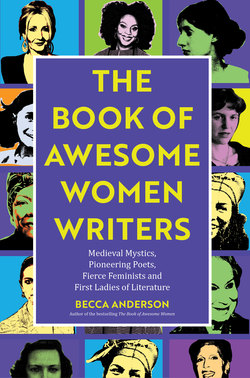Читать книгу Book of Awesome Women Writers - Becca Anderson - Страница 8
На сайте Литреса книга снята с продажи.
ОглавлениеForeword by Vicki León
author of the Uppity Women series
With her new book, Becca Anderson has made it not only legitimate but cool to be book-mad. As a woman with a chronic case of bibliomania, I’m delighted to see we’re out of the closet. Of course, it makes me anxious, too; will there be enough books for everybody, if, you know, all those other people become bibliophiles?
As a student of history, I’ve learned that we’re in supremely good company. Ever since there have been books, there have been bookworms. That’s more than four thousand years of voracious reading—and a lot of it accomplished by women. The making of books was a scary new technology: marks made on clay or silk or paper became time capsules of knowledge. They conveyed secrets. They ignored distances. No wonder that, early on, books became sacrosanct in ways we cannot even imagine.
From the earliest times, females honed in on the reading, transcribing, and authoring of books. Take ancient Mesopotamia, for instance. Although it made males quite testy, women occasionally became scribes. In fact, the earliest author we know of in history—male or female—was a priestess and poet named Enheduanna of Ur, whose work dates from 2500 BCE. Only boys were supposed to learn reading and writing. So many women managed to do so, however, that a distinctively female written dialect called emesal came into being.
Books in Mesopotamia were palm-sized or smaller, durable, and portable. They were made of clay and were able to be reused. They sound suspiciously like the smartphones and e-books of today, don’t they?
With literacy came cupidity. Thousands of years ago, women lusted for books—and began to collect them. One of the earliest bibliophiles was—surprise—the world’s most famous sex goddess and political schemer: Cleopatra the Seventh. At Alexandria, the Egyptian queen possessed a world library that was without parallel. A lifelong student of philosophy, she got a voluptuous enjoyment from reading. When Marc Anthony set out to win Cleopatra’s heart, he knew just what to give her: the library at Pergamum in Asia Minor—the second most wondrous in the world. (It was, however, a nightmare to gift wrap.)
A few hundred years later, highly educated Roman women took part in one of Christianity’s great literacy projects. Women like Paula and her daughter Eustochium spent thirty-five years translating the Bible into Greek and Latin under the direction of early Christian writer and glory-hound Jerome, who took all subsequent credit for the work of his corps of skilled female readers and translators.
On the other side of the globe, Asian women had been hip-deep in bibliomania since the eighth century, when a bright Japanese empress named Koken ordered up a print run of one million copies of religious verse—Asia’s first block printing project.
From the eleventh through thirteenth centuries, a golden age of reading and writing bloomed among Japanese literati with women at its forefront. The hands-down superstar of the age was Murasaki Shikibu, whose psychological novel, The Tale of Genji, is now considered the world’s first “modern” novel. As in Mesopotamia, the number of women involved in reading and writing reached such a critical mass that the phonetic Japanese writing system called hiragana came to be called “woman’s hand.”
In medieval times, nuns fought to save the collected wisdom of the world in permanent form. Although literacy took a nosedive among Europeans, here and there women still managed to read, write, and collect books; Eleanor of Aquitaine, for instance, and Heloise, the nun whose hots for Abelard overshadowed her love for books. There were lesser lights we haven’t heard much about, too, like Mahaut, the French Countess of Artois. Glamorous Mahaut traveled with sixty horses, forty servants, and her best illuminated books carried in special leather bags. One of her favorites was The Book of the Great Cham—the tell-all by Marco Polo.
So go on, do some guilt-free indulging in the pages of Becca Anderson’s basket of literary bonbons. She has gathered a wealth of delectable stories in which to immerse ourselves, a bite at a time. Let’s hear it for bibliophiles and book ladies—our richest yet most non-fattening vice. Thanks to women from Aphra Behn to Zelda Fitzgerald, we can enter the most magical looking glass of all: the bright world beyond the moment, the one we call “literacy.”
